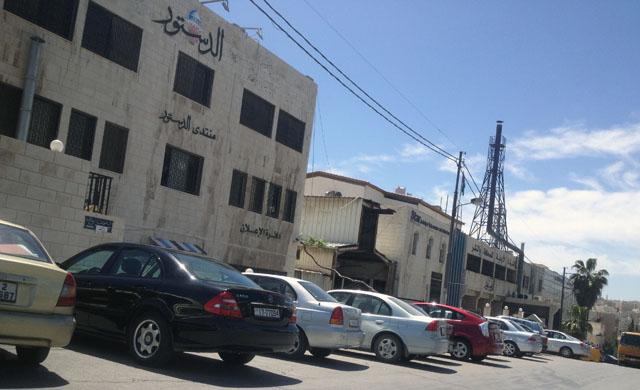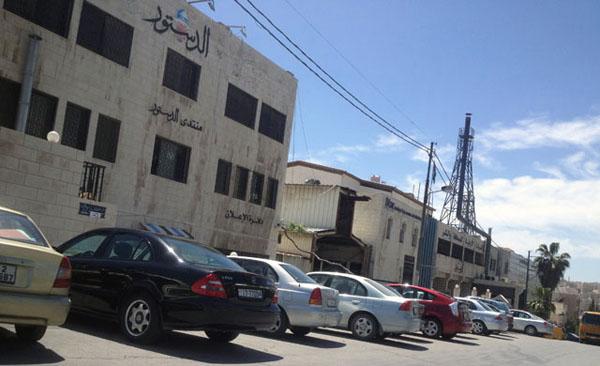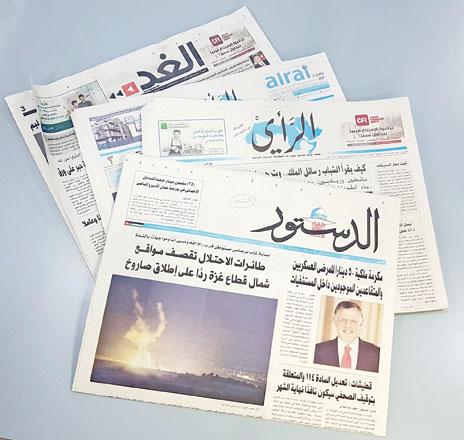You are here
Sector insiders say gov’t move to support print media step in right direction, but not enough
By Mohammad Ghazal - Apr 19,2015 - Last updated at Apr 19,2015

AMMAN — Sector leaders on Sunday said the government's decision to increase advertisement rates it pays to newspapers and temporarily exempt their production input from customs duties will partially alleviate the financial difficulties facing print media, but more efforts are needed.
A committee representing Al Rai Arabic daily editorial team described the decision as insufficient and called for more measures to help newspapers suffering from tough economic conditions.
Sector insiders said government support is crucial to dailies, many of which have been facing financial difficulties that made at least one of them unable to pay staff salaries for five consecutive months.
In a decision Sunday, the Cabinet raised the public advertisement rate in newspapers from 100 fils to 250 fils per word. The government had been paying 65 fils per word since 1973 until February 2014 when it increased the rate to 100 fils.
The Cabinet also decided to exempt newspaper production inputs from customs duties for a period of two years.
The Council of Ministers also allowed public institutions to increase their subscriptions to newspapers by 100 per cent. In 2011, the government adopted a media code of conduct that sharply reduced government subscriptions to dailies.
Dhaher Damen, managing editor in Al Rai and a member of a committee representing the daily’s staff, said the government can do more to help newspapers suffering financial hardships, including introducing a freeze on income tax until papers overcome the current challenges.
Damen, whose newspaper is currently boycotting government news for its refusal to help the daily tackle financial and administrative problems as well as refusal to change the board of directors running the publishing company, the Jordan Press Foundation (JPF), said the editorial team will continue to demand more measures.
JPF Finance Director Khaled Ajaj told The Jordan Times that production inputs were already exempt from taxes. Thus, this government decision adds nothing to the current situation and will not be of any help, Ajaj said.
As to the second decision to increase government ad rates, it would be also of little help as it will remain below market prices and the real cost shouldered by newspapers.
JPF Advertisement Director Omar Allan explained that raising government advertising rates could mean an increase in revenues for Al Rai, the country’s leading newspaper, of around JD150,000 annually, which would not be enough to offset the continuing drop in revenues.
Allan told The Jordan Times over the phone that this decision means that government ads would still be subsidised by newspapers as they would running at less than the real cost per page. “A full page costs Al Rai more than JD800, and when the government pays per word, this means it will pay almost JD600 per page,” Allan explained.
It would be fair to have the government pay the usual commercial rate for ads rather than having a special rate for official ads, he said.
JPF Director General Farid Silwani earlier welcomed the decision and said the government should increase its ads in newspapers.
More efforts are needed to help print media, he said, and the “solution does not solely lie in the hands of governments”.
“All media outlets need to work on enhancing distribution, marketing and productivity and at our foundation we have a plan to have our own distribution company that will be ready by year end. In addition, we have our own plan for marketing,” Silwani noted.
Awni Daoud, managing editor of Ad-Dustour’s economic section, welcomed the decision, which he said comes at the right time and shows the government’s seriousness in addressing the difficult financial conditions local newspapers are currently going through.
“It is the role of all shareholders in newspapers such as the Social Security Corporation [SSC] to take similar steps. They need to intervene to increase dailies’ capital,” Daoud added.
“At the same time, newspaper managements are required to implement effective steps to enhance marketing and distribution, and increase productivity. At Ad-Dustour, for example, there is a need for quick intervention as employees have not received salaries for five months in a row, so to increase their productivity, their labour rights should be fulfilled,” he noted.
The state-owned Social Security Investment Fund (SSIF) owns nearly 30 per cent of the Jordan Press and Publishing Company, which publishes Ad-Dustour, and is the major shareholder in the JPF with around 55 per cent of shares.
Al Rai employees accuse some SSIF-appointed board members of preparing a restructuring plan while failing to address the continuous fall in revenues, mainly generated from advertisements.
They accuse the JPF board of failing to find a solution to the commercial printing press on the airport road, which cost over JD35 million, saying that it has drained the finances of the foundation with millions of dinars pumped into it every year.
The employees want the printing press to be transformed into an independent company and sold to the SSC, which they accuse of starting the project in order to help the JPF return to profitability.
They also want board members Abdul Hafiz Ajlouni, Mansour Nabulsi, Mohammad Tarawneh and MP Abdul Rahim Biqaai to be replaced.
Although the Jordan Press Association (JPA) welcomed the Cabinet decision, it said it was not enough.
“We thank the government for this, but there are major issues that shareholders in newspapers need to address, including increasing the capital of Ad-Dustour and looking into a solution for the JPF’s printing press complex,” JPA President Tareq Momani said over the phone.
“Financial challenges facing print media in Jordan are immense; therefore, such measures — though appreciated — are not enough. We need to see more efforts to salvage local print media,” Momani told The Jordan Times, stressing that the decision is a step in the right direction.
Also on Sunday, Lower House Speaker Atef Tarawneh commended the Cabinet decision, calling on stakeholders to cooperate with the government to implement it, the Jordan News Agency, Petra, reported.
The speaker said the House respects the fourth estate and appreciates its national role.
Omar Obeidat contributed to this report
Related Articles
Ad-Dustour daily’s administration has laid off 46 staff members, including eight journalists, as the paper’s financial crisis continues, an employee said Sunday.
The Jordan Press Association (JPA) on Sunday warned of a humanitarian and professional crisis at Ad-Dustour daily, where employees have not received their salaries for seven months.
AMMAN — Jordan Press Association (JPA) on Saturday said the government’s recent decision to publish judicial advertisements in the country’s



















